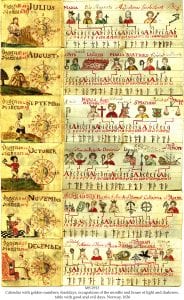Conference: Calendars in Antiquity and the Middle Ages
By uclhcmm, on 11 September 2017
By Nadia Vidro and Ilaria Bultrighini
On 3–5 July 2017 the ERC Calendars project team, together with the UCL Institute of Jewish Studies, ran our final conference Calendars in Antiquity and the Middle Ages. This conference presented the outcomes of the team’s research on the history and evolution of calendars in late antique and medieval societies, together with contributions from international collaborators in the field.
Jump to day 1, Antiquity and the Early Middle Ages / Jump to day 2, Later Middle Ages
The conference opened in the evening of 3 July with a keynote lecture How calendars become standardized and fixed by Sacha Stern, the project’s PI. Stern introduced the ERC Advanced Grant Project Calendars in Antiquity and the Middle Ages: Standardization and Fixation and described its five research areas. He then set out to explain how calendars in Europe and the Near East transformed from flexible, non-standard and predominantly lunar calendars of the ancient world to fixed and predominantly solar calendars of the early Middle Ages. Stern connected the standardization of calendars with the formation of empires with their imperial culture and unified administration, and with religious changes from pagan pluralism to orthodox monotheism. Stern presented three case studies to demonstrate the processes of calendar standardization. The seven–day week stems from the two distinct traditions of the planetary and the biblical week, which gradually merged into one hebdomadal cycle, starting in the late 1st century CE and culminating in the 4th century CE. Stern recognised two main processes in place towards the standardization of the seven-day week: on the one hand, the imperial hybridization in the Roman Empire, and on the other, the diffusion of Easter tables and the impact of Christianisation. In the 921/2 the calendar dispute between the Babylonian and the Palestinian Jewish communities the main vehicle of ensuring that everybody used the same calendar was to write a book on the correct calendar and to decree that it be read regularly. The data line was conceived in the Middle Ages mainly by Jewish thinkers who, owing to their ideology of standardized time, strived to count the day of the week in the same way around the globe.
 Close
Close


